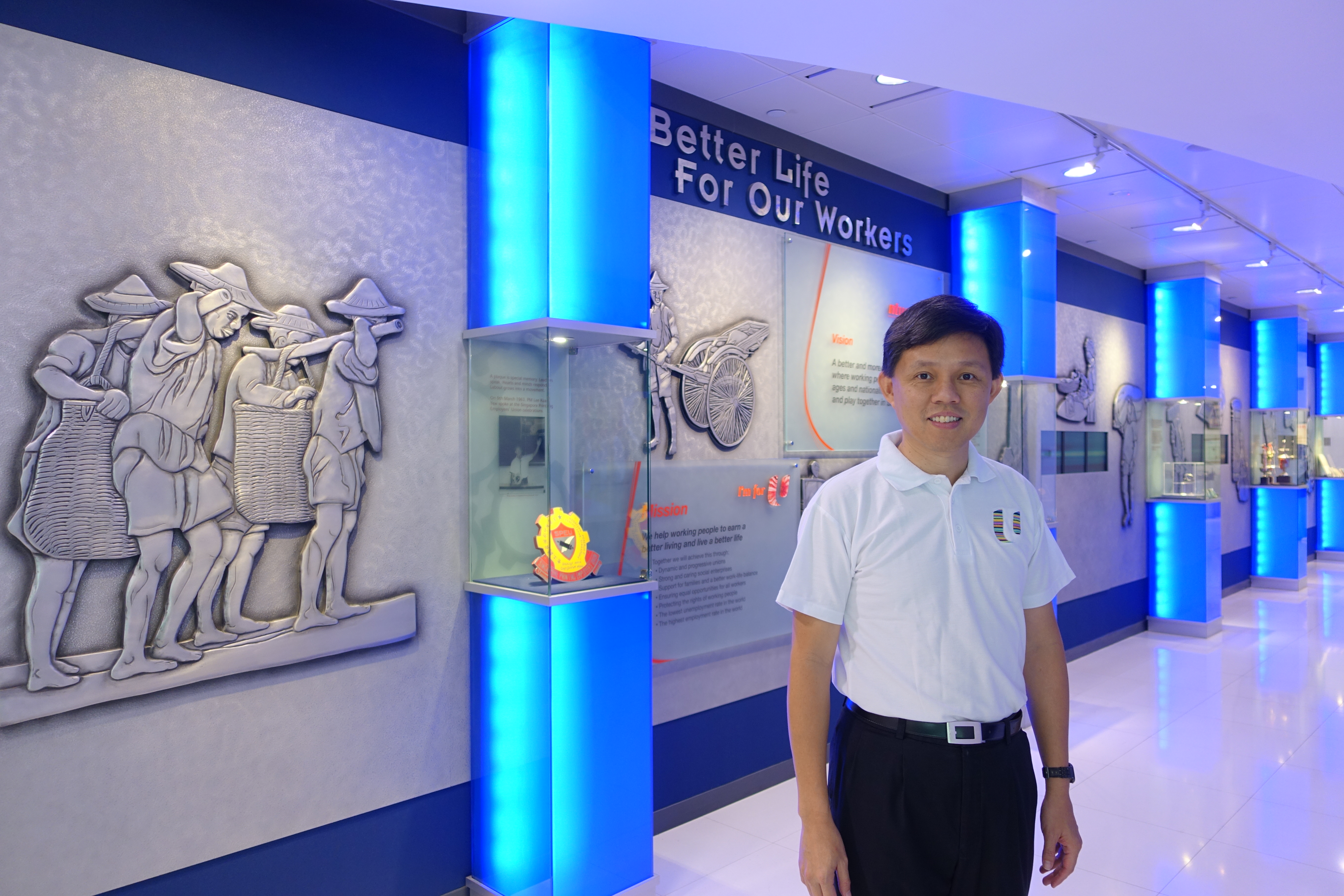Unlike his Cabinet colleagues, Labour Chief Chan Chun Sing cannot afford the time and luxury to bask in the glory of his party's landslide victory.
Minister Chan experienced a gruelling General Election last month and passed with flying colours. He scored an "A1" as his Tanjong Pagar GRC team secured a 77.71% win against the Opposition.
This is round two for Chan as he gears up for another election - one that is touted to be as competitive as GE2015 and of the utmost importance to Singaporean workers.
The National Delegates' Conference (NDC), conducted every four years to elect 21 leaders of the Labour Movement will be under way next week – some six weeks after GE2015.
That said, the Secretary-General of the National Trades Union Congress (NTUC) seems pretty composed and chill during our interview, brushing off any kind of stress by borrowing a Chinese idiom to illustrate his level of chillness: No 临时抱佛脚 (Chinese for last minute attempt to get things done or hugging the buddha's leg) for him.
His prescribed philosophy, something he describes as doing things conscientiously, is to make sure that there will be no last minute work to win over the electorate, and in NDC's case, the unionist.
"If you take care of the residents, the residents will take care of the result for you. In NDC, I will also say this: 'If our union leaders have taken care of the union members and the workers, the union members and workers will take care of the result,'" he concludes.
And thus no hugging the buddha's leg for him.
Ok.
Since someone's analogy game is strong, we challenge him to explain why NTUC is not just a supermarket.
Cheem terminology: Tripartism
Chan's analogy: Trust
Once upon a time, I went to this meeting involving the management, government and the Labour Movement. I told them: 'The enemy is not in this room. The enemy is the competition out there.'
In other words, we either hang around together or we get hung separately. This is the why of tripartism.
The how of tripartism consists of five letters: Trust. It's a simple concept but how do we earn trust?
Trust is a bit of give and take when times are tough; I watch your back, you watch mine. It's really the unity of purpose. But it all starts from this: Singapore got nothing as a natural advantage to compete with others. We have to create our own competitive advantage.
We have to stick together and create it. So I might be slightly more expensive than you, but if I have no strikes, no disruptions, my quality is better, I improve faster, I have created a competitive advantage.
Some angmoh also said that Singapore is a living example of tripartism in action.
Cheem terminology: Evolution of the work force
Chan's analogy: The long and short of things
Chan says that while the plan which NDC charts out for the next four or five years is different, the objective or challenge of ensuring job security and improving quality of life remain constant.
The key is to overcome some of these issues.
"There are short-term issues and long-term issues. For short-term, if you look around the world in this period, it's very difficult to find a bright spark to lift our economic growth.
And we are very dependent on external markets. So obviously that's a cyclical or short-term challenge that we have to grapple with. Just like now how many people are jittery of the economic conditions in the next few months or the next one year.
In terms of longer-term challenges, the nature of the jobs have changed. For example, the product cycles are much shorter as compared to the past. The best example is telephones. In the past, when you buy a telephone with a dial, you can use it for 20 years. If you produce telephones, chances are, you will get the job for 20 years because the product is the same.
Now when you buy a smartphone, chances are, every other week you've got to update your software. Even for your hardware, every six months to two years there will be a new product launch. The product cycle has shortened and become more intensive which means that job cycle has to follow.
Cheem terminology: Current state of training and upgrading
Chan's analogy: The constant upgrading of your phone's OS
Reminiscing the past when his mother's main skill set was able to satisfy job requirements for decades, he concludes that the same cannot be said of this generation.
"My mother used to be a machine operator and make ring caps for chicken of essence bottles at home. You can do that for 10, 20 years.
Last time, it's called compulsory education. Finish your compulsory education and you are set for the rest of your life. Now, it's about continuing education. Everyone has to go back to training every five to 10 years to upgrade the iOS equivalent.
Previously, the model could be this: If I know you are going to be with me for 20 years, I will send you for training and I know what training you need because I can see my product cycle.
But now, the product cycle is shorter and more volatile and I don't know whether you will be with me for the long term.
For example, why should I train you if you are producing the current set of handphones for me? Sometimes it's not that the companies don't want to train you, it's just that they might not know how to. And due to the volatility, I might just hold back rather than invest in you.
Previously, training is done through the company but SkillsFuture is fundamentally different; it allows the individual to center the training around him. Even if you change company regularly, the skill sets are still invested in you."
Cheem terminology: The Labour Movement under his watch
Chan's analogy: Care, fair and grow
"We always return to these three words: Care, fair and grow. It affects the way I take care of my workers, it affects what it means to be fair to our workers and it affects what we do to grow with our workers. These three words are fundamental."
Cheem terminology: Keeping up with the white-collar's aspirations
Chan's analogy: It's not just about the depth, it's the breadth
"PMETs are not talking about collective bargaining, it doesn't really apply to them. They are looking for professional development opportunities, they are looking for exposure to prepare them for the next lap, to climb up the corporate ladder, which means they need not just the depth but also the breadth. That's where we come in."
For example, he says, engineers can join the U Associates' Young Engineer Programme. In the U Associates programme, they can pick up skills beyond engineering. As they mingle with the different professions under the programme, they also learn HR and management skills.
Cheem terminlogy: NTUC is a hub connecting workers together (#SimiSaiAlsoHub)
Chan's analogy: NTUC is Changi Airport
"NTUC is a bit like Changi Airport. Airlines get their value add by taking off and landing here. But the greatest value is the hub connection, the network connection.
Our value add service is not just taking care of your landing and take off, we also take care of your connectivity with other people.
We want to band all the Singaporean professionals together and we hunt as a pack. So when we compete overseas, we know each other from different professions and we go in as a team."
Cheem terminology: Requisite of a Labour Chief
Chan's analogy: Change parade
"It's a very broad range of experience. In the morning you can have your shoes in the mud, in the evening you might wear a bow tie.
It's quite typical of my day - you go to a ground unit and visit operations in a petrol chemical plant or a construction site. So I always have a hard hat in the boot of my car.
Suddenly, by lunch time, you are wearing a suit and tie trying to talk to the big bosses, trying to convince them to support the labour movement.
We always joke about the number of attires in our car but the attires are just a reflection of the diversity."
If you like what you read, follow us on Facebook and Twitter to get the latest updates.
If you like what you read, follow us on Facebook, Instagram, Twitter and Telegram to get the latest updates.





